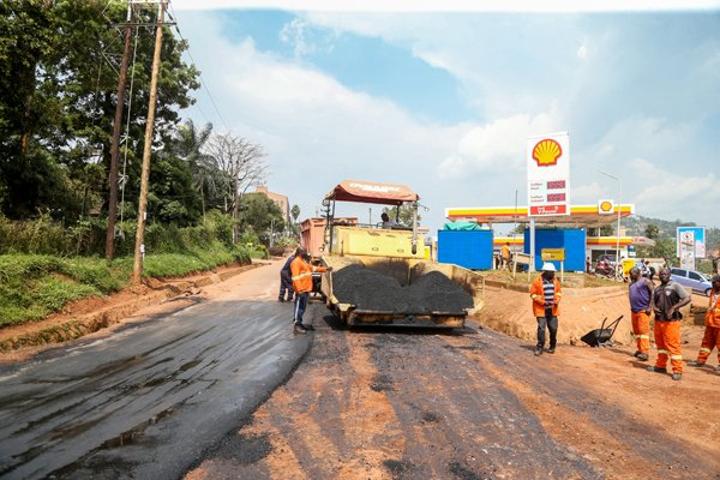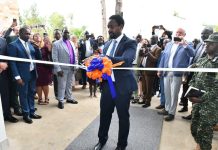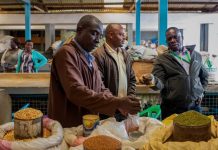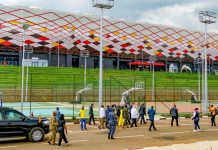Africa-Press – Uganda. Limited or inconsistent flow of information relating to construction projects of some key infrastructures awarded by Kampala Capital City Authority (KCCA) is constraining transparency and accountability efforts meant to streamline the sector operation.
Works and transport economic sector on average accounts for the lion share of budget annually. In the next five years alone, going by the KCCA master plan, it will require at least Shs7.5 trillion to change the face of Kampala into well-planned City that provides economic opportunities to all.
It is for this reason that sanity in procurement and delivery of infrastructural works awarded by KCCA is scrutinised accordingly.
For this to happen seamlessly there is need to have institutions such as KCCA provide regular project information to allow transparency and accountability to taxpayers and funders of the projects under their control.
Although KCCA says it will do the best it can to efficiently avail as much information as possible, there is no reason as to why mandated institutions and entities do not proactively make available information regarding status of the projects being funded by taxpayers and development partners.
A case in point is the Kampala Institutional and Infrastructure Development Project (KIIDP2) which entails upgrade of 5.52 kilometres, reconstruction and duelling of 4.25 Kilometres roads including signalisation of 10 junctions in Nakawa and Central divisions by M/S China State Construction Engineering Corporation Ltd.
Another situation involves contracts for city design update and construction of selected drainage system by M/S Bisons Consult International and Abubaker Technical Services and General Supplies Ltd.
According to the analysis of disclosed data contained in the Assurance Report conducted by the Construction Sector Transparency (CoST), KCCA’s overall proactive disclosure of project information is at 55 per cent. Although this is slightly above average, it leaves a lot to be desired in terms of consistence and frequency in disclosure of key project information.
Generally, disclosure of the KIIDP2 is above 65 per cent on average and 48 per cent on the upgrade of design and construction drainage system of the two aforementioned projects.
However, according to the 4th Assurance Report, although levels of disclosure are not to the required standards, overall there has been improvement from in the level of disclosure from the first assurance process.
For example, analysis of disclosed data revealed that the level of proactive disclosure for the KIIDP2 project was 67 per cent while reactive disclosure was at 68 per cent. This is better than the 1st Assurance process on the project.
Sector analysts and KCCA senior officials interviewed for this article attributes this improved development in disclosures to independent sector prefects such as CoST whose relentless calls and initiative towards transparency across infrastructure value chain is beginning to bear some fruits.
Stakeholder engagement and the development partners (donor) requirement on fulfilling key demands as pertaining to access to information also played a huge role in improving level of proactive disclosure to date.
To maintain the level of proactive disclosure as has been evident from the 1st Assurance Report, KCCA is encouraged to enhance disclosure levels by considering full disclosure of additional data points, especially at project implementation and completion phases.
This will improve public relations, increase stakeholder engagements, appreciation and ownership of built infrastructure as well as rebuilding the dwindling public trust.
Issues
For contracts of city design update and construction of selected drainage system awarded through open international bidding to M/S Bisons Consult International Ltd was valued at Shs 4.2 billion while UB Consulting Engineers were the supervisors. The findings and analysis from disclosed data revealed that 48 per cent of the project information was proactively disclosed while 78 per cent was reactively disclosed.
The contract committee from KCCA approved three time extensions but the physical progress was 56 per cent, just slightly above average. It wasn’t long before the contract between Bison Consult International and KCCA was terminated resulting from a recommendation from consultant (UB Consulting Engineers).
Reasons explaining the termination of the Shs4.2billion contract, according to the 4th Assurance Report ranged from the absence of key staff at site to resolve the technical issues, failure to update the work program, inability to provide accountability for the advance payment, poor site resource mobilisation to slow progress of works.
The contract according to the sector report is under arbitration since March 2020.
Importantly perhaps, KCCA recovered the lost project amount and a new contractor (Lina Construction Limited) was procured with a works costing Shs4.4 billion. Although the project cost slightly went up nevertheless it was completed about four months ago (in October 19, 2020).
The other similar project was valued at Shs4.6 billioin was awarded to M/s Abubaker Technical Services and General Supplies Limited. This project covers Kawempe Division with Consultants M/s PROME consult the designated consultant.
The findings and analysis from disclosed data revealed that 48 per cent of the project information was proactively disclosed while 78 per cent was re-actively disclosed. The contract commenced on 16th June 2016 and the projected completion date was 16th June 2017.
This didn’t go according to plan as the KCCA contract committee had approve eight times extension of the project as a result of additional works on Kawooya Drain. However the project was eventually completed about two years ago (in January 2019).
Disturbing scenarios were also observed during the site visits. Some of which include putting up non-functional toilets near material stock pile, contractor’s supervisors were seen smoking near the staff, some of whom were non-smokers and access to safe water was not obvious to all at the site.






